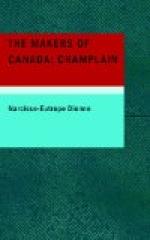Brother Sagard makes these remarks upon the condition of affairs:—“It is true that there was a great scarcity of all things necessary for the habitation, but the enemy, too, were weak, as Father Joseph perceived after having examined the whole crew, which consisted of about two hundred soldiers, for the most part, men who had never touched a musket, and who could have been killed as ducks or who would have run away. Moreover they were in a wretched condition, and of a low order. The weather was favourable to the French, as the tide was low, and the wind from the south-east was driving the vessels towards France, so that there was no assurance for either the vessels or the barques. Champlain, however, deemed it more expedient to surrender than to run the risk of his own life or of being made a prisoner while defending a fort so badly armed.”
If, as the veracious Brother Sagard says, the fort and the habitation were distressed, it is not proved that the English could be easily defeated. There were at Quebec only fifty men capable of bearing arms, and only a small quantity of gunpowder in store, while provisions were absolutely wanting. How was it possible to sustain a siege without ammunition, without bread and without soldiers?
On the enemy’s side there were two vessels well equipped, and two hundred men. If the men were desperate or wretched, they would be the more dangerous. Even supposing that the two vessels had proved insufficient for a protracted siege, the four vessels at the disposal of David Kirke would have surely come to their assistance.
It would have been a foolish act to have resisted such a powerful enemy. Besides, Champlain had another foe to contend against, for Nicholas Marsolet, Etienne Brule, Pierre Reye, and others, had betrayed him, and were leagued with Kirke. Champlain understood the difficulties of his position, and his responsibilities, for he had in his hands the lives of one hundred persons.
Of the eighty persons living in Quebec at this time, only two-thirds had private interests to safeguard, and it was a matter of indifference to them whether they remained in Canada or whether they returned to France. The families who had nothing to gain by leaving Quebec were those who deserved the governor’s sympathy, and it was for their safety that Champlain would not agree to offer resistance, as the result must have proved disastrous to them. By the articles of capitulation these families would be able to live quietly at home, awaiting the issue of negotiations.
On the day following the preliminaries, Champlain went on board Louis Kirke’s vessel, where he was to see the commission of Charles I, which empowered the Kirke brothers to take Quebec and the whole country by assault. Both parties then signed the articles of capitulation, and the English troops, conducted by Champlain, came in shallops near to the habitation. The keys were delivered to Louis Kirke, and then they




